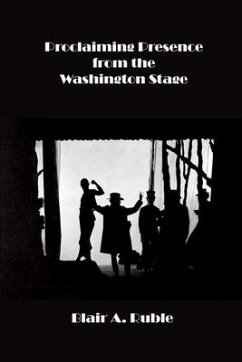
Proclaiming Presence from the Washington Stage
Versandkostenfrei!
Versandfertig in über 4 Wochen
25,99 €
inkl. MwSt.

PAYBACK Punkte
13 °P sammeln!
Washington, uniquely among American cities, has remained disenfranchised since its founding as a federal enclave. In the absence of an overarching political life, the very meaning of "local" became contested. Residents and communities seeking to establish their presence in the city-and, because of its capital status, the nation-confronted prohibitions against the sort of political action evident elsewhere throughout the country. For much of the twentieth century, the local life of the theater offered an alternative path to recognition as a step toward acceptance. Energetic theater leaders repr...
Washington, uniquely among American cities, has remained disenfranchised since its founding as a federal enclave. In the absence of an overarching political life, the very meaning of "local" became contested. Residents and communities seeking to establish their presence in the city-and, because of its capital status, the nation-confronted prohibitions against the sort of political action evident elsewhere throughout the country. For much of the twentieth century, the local life of the theater offered an alternative path to recognition as a step toward acceptance. Energetic theater leaders representing various communities pursued social and artistic acceptance by proclaiming presence from Washington stages. This book recounts four such efforts: those of African American cognoscente to establish a national Negro theater; those of Roman Catholic clerics to nurture a theater for the nation reflecting their values; those of theater enthusiasts to demonstrate the power of regional theater in an American stage community preoccupied with Manhattan; and, those of community activists to assert the legitimacy of the disenfranchised to establish their own civic presence. Together, these efforts fostered a theater scene by century's end that would emerge as the second most attended in the country behind only New York. This industry, in turn, propelled an exploding cultural community that transformed a once sleepy, Southern, provincial town into a vibrant international arts center.


